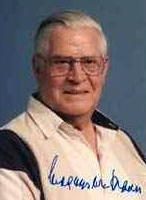Spouse Hildegard Buchhold (1950-1955)
Nathalie "Nan" Heaton-Woodruff (1957-2003)
Von Braun was born in Greifswald, Pomerania, to Magnus Freiherr von Braun and Emmy von Quistorp. After completing boarding school at Hermann Lietz-Schule in Spiekeroog, he began his studies in 1937 at Technische Universität München. There he remained after receiving his Master's degree in organic chemistry, and became an assistant to Nobel laureate Hans Fischer.
Von Braun arrived at Peenemünde in July 1943 at the request of Wernher von Braun. In March 1944 he was arrested with fellow rocket specialists Wernher von Braun, Klaus Riedel, Helmut Gröttrup, and Hannes Lüersen, but was later released. In late summer 1944 he transferred to the Mittelwerk where he engineered V-2 rocket gyroscopes, servomotors, and turbopumps.
It should be noted that Magnus was born nearly a decade after his two older brothers, who had come of age before the Nazis took power in Germany. Unlike them, Magnus had a National Socialist adolescence. While the older brothers can be seen as having joined the Nazi party for reasons of professional advancement, Magnus signed on to fascism at a point in life before such concerns became important. His was an ideological commitment. He was thirteen when Hitler became chancellor and thus participated in the Hitler Youth organization and experienced a secondary school environment and curriculum adapted to fascism. His politicized early years naturally influenced his character. Even after the war, Magnus stood apart from Wernher by his displays of arrogance and aristocratic pretension, duly noted by the Army officers who kept files on both men after their 1945 immigration to the United States. Sigismund, the eldest brother, became a diplomatic attaché for the German government in 1936 and passed his war years in Vatican City on consular duty. Though a Nazi party member like his brothers, he avoided direct complicity with regime atrocities such as slave labor and was able to join the new West German foreign service after the war. He rose to became a notable diplomat for West Germany during the 1960s and 1970s.
Spouse Hildegard Buchhold (1950-1955)
Nathalie "Nan" Heaton-Woodruff (1957-2003)
Von Braun was born in Greifswald, Pomerania, to Magnus Freiherr von Braun and Emmy von Quistorp. After completing boarding school at Hermann Lietz-Schule in Spiekeroog, he began his studies in 1937 at Technische Universität München. There he remained after receiving his Master's degree in organic chemistry, and became an assistant to Nobel laureate Hans Fischer.
Von Braun arrived at Peenemünde in July 1943 at the request of Wernher von Braun. In March 1944 he was arrested with fellow rocket specialists Wernher von Braun, Klaus Riedel, Helmut Gröttrup, and Hannes Lüersen, but was later released. In late summer 1944 he transferred to the Mittelwerk where he engineered V-2 rocket gyroscopes, servomotors, and turbopumps.
It should be noted that Magnus was born nearly a decade after his two older brothers, who had come of age before the Nazis took power in Germany. Unlike them, Magnus had a National Socialist adolescence. While the older brothers can be seen as having joined the Nazi party for reasons of professional advancement, Magnus signed on to fascism at a point in life before such concerns became important. His was an ideological commitment. He was thirteen when Hitler became chancellor and thus participated in the Hitler Youth organization and experienced a secondary school environment and curriculum adapted to fascism. His politicized early years naturally influenced his character. Even after the war, Magnus stood apart from Wernher by his displays of arrogance and aristocratic pretension, duly noted by the Army officers who kept files on both men after their 1945 immigration to the United States. Sigismund, the eldest brother, became a diplomatic attaché for the German government in 1936 and passed his war years in Vatican City on consular duty. Though a Nazi party member like his brothers, he avoided direct complicity with regime atrocities such as slave labor and was able to join the new West German foreign service after the war. He rose to became a notable diplomat for West Germany during the 1960s and 1970s.
Family Members
Sponsored by Ancestry
Advertisement
Explore more
Sponsored by Ancestry
Advertisement







